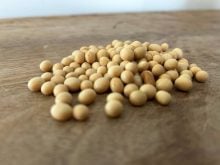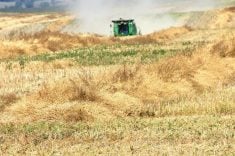Paris | Reuters — The European Commission on Friday reduced its forecast for usable production of common wheat in the European Union in 2024/25 to a 12-year low as it continued to factor in adverse weather in the bloc.
The Commission now estimates production of common wheat, or soft wheat, this season at 114.6 million tonnes, down from 116.1 million predicted a month ago and nine per cent below last year’s crop.
It is also the lowest volume since 2012/13, bringing the Commission into line with other recent forecasts of the EU’s main cereal crop.
Read Also

U.S. grains: Soybeans rise on China demand hopes; corn and wheat rebound
Chicago Board of Trade soybean, corn and wheat futures rose on Monday on signs of progress towards the end of a record-long U.S. government shutdown, along with expectations of a revival of U.S. soybean exports to China, analysts said.
The EU harvest has been dented in particular by the smallest crop in France in 40 years, as well as a sharp fall in German production as the bloc’s two biggest wheat growers endured repeated heavy rain in the past year.
In monthly supply and demand data, the Commission increased its projection of EU soft wheat imports in 2024/25 by one million tonnes to seven million but left unchanged its soft wheat export forecast for this season at 26 million tonnes.
It lowered its forecast for 2024/25 usable production of maize in the EU to 60.1 million tonnes from 61.6 million in late August, now four per cent below last season’s level.
Maize crops, harvesting of which is under way, have been hurt by summer drought and heatwaves in the east of the bloc.
Estimated EU barley production in 2024/25 was also revised down, to 50.4 million tonnes from 51.3 million a month ago, though that was six per cent above last year’s drought-hit crop.
In oilseeds, the Commission lowered its estimate of the bloc’s rapeseed output this season to 17.2 million tonnes from 18.0 million, nearly 13 per cent below last year’s level.
For sunflower seed, which has also suffered from drought in eastern Europe, the Commission cut its production forecast to 9.5 million tonnes from 9.9 million, three per cent below the previous crop.














